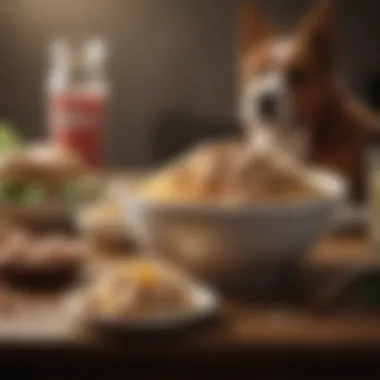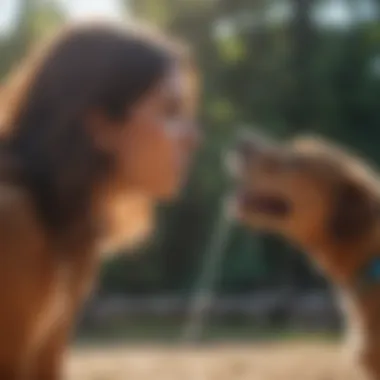Effective Solutions for Dogs with Diarrhoea


Intro
Diarrhoea in dogs is a common, yet often concerning issue for pet owners. It can arise from various underlying causes, including diet changes, infections, or stress. Understanding how to manage this condition is crucial for maintaining your dog’s overall health.
This article will explore dietary options that can benefit your dog during episodes of diarrhoea, alongside potential causes and essential care tips. A well-informed approach not only addresses the immediate symptoms but also contributes to long-term wellness.
Understanding Your Pet
Breed Traits
Some dog breeds may be more susceptible to certain gastrointestinal issues than others. For example, breeds like the Chihuahua or Dachshund may experience digestive problems due to their unique physiological traits. Recognizing these breed-specific traits can guide pet owners in developing an appropriate care plan tailored to their dog’s needs.
Common Temperaments
Understanding the temperament of your dog can also influence how they react to dietary changes. For instance, anxious dogs might develop digestive problems when stressed, leading to diarrhoea. Knowing your dog's personality can prompt necessary changes to reduce stress, such as implementing a stable feeding routine.
Special Needs
Certain dogs have unique dietary requirements based on their age, health condition, or breed, such as senior dogs or those with underlying health problems. Consulting your veterinarian can help you determine any specific needs before proposing changes to their diet during digestive upset.
Pet Care Essentials
Nutrition and Feeding Guidelines
When a dog suffers from diarrhoea, it is crucial to focus on their nutrition. A bland diet, often starting with boiled chicken and rice, can help ease their digestion. As symptoms improve, slowly reintroduce their regular food while monitoring their response. Here are some dietary guidelines:
- Hydration is essential. Ensure your dog has access to fresh water at all times.
- Avoid giving any table scraps or fatty foods until symptoms resolve.
- Gradually reintroduce their previous food over several days.
Grooming Tips and Techniques
While grooming may not directly impact diarrhoea, maintaining overall hygiene is important. Regular grooming can help reduce itching or discomfort associated with sensitive digestive health. Pay attention to your dog's coat and skin during this time. Noticing changes can indicate underlying health issues that need to be addressed.
Health and Wellness
Regular veterinary check-ups are vital. Persistent diarrhoea might be a symptom of underlying health issues. Watch for warning signs that indicate the need for veterinary attention, such as blood in stool, lethargy, or prolonged symptoms beyond 24 hours.
Remember: Diarrhoea may result from varied causes, some of which require immediate veterinary intervention.
Training and Behavior
Basic Training Techniques
Training can help create a positive environment for your dog, which may lessen digestive upset caused by anxiety. Techniques include positive reinforcement for desired behaviors. This can create a sense of security for your dog. A confident dog is less likely to experience stress-related digestive issues.
Behavioral Problems and Solutions
Sometimes, behavioural issues can contribute to digestive problems in dogs. Monitoring your pet’s routines and habits can help identify stressors. Utilizing calming techniques, like providing a safe space or interactive toys, can minimize anxiety during recovery from diarrhoea.
Mental Stimulation Activities
Keeping your dog's mind engaged can divert their attention from stress. Short training sessions or puzzle toys can provide both mental stimulation and a positive outlet for energy. This is especially helpful when they are recovering from digestive upset.
Engaging with Your Pet
Interactive Games and Toys
Interactive games can aid recovery by promoting mental engagement. Simple activities like hide-and-seek or basic fetch can help maintain a positive mindset. Engaged dogs are generally more relaxed, which can help prevent recurrence of gastrointestinal issues.
Safe Outdoor Activities
Gentle walks can aid recovery. However, it’s important not to overdo it. Short, controlled outings can provide necessary physical release without stressing the digestive system. This fosters a routine that reestablishes normalcy for your dog.
Family-Friendly Pet Interactions
Encourage positive interactions among family members. This builds a nurturing environment that can lessen anxiety for your pet. Understanding how to approach your dog gently, especially while they recover from diarrhoea, is important to create a safe atmosphere.
Pet Adoption and Integration


Choosing the Right Pet for Your Lifestyle
When considering pet adoption, evaluate your lifestyle and the specific needs of various breeds. This ensures a good match and less chance of stress-induced digestive problems as time goes on.
Preparing Your Home for a New Pet
A proper setup can prevent initial anxiety. Establish a designated space for meals, bedding, and play. This familiarity can make adoption smoother and prevent digestive disturbances also.
Tips for Smooth Preface
Once you adopt a new dog, gradual introductions to its new environment can ease transition. Allow for gradual familiarization with household routines to reduce stress, which in turn can decrease the risk of digestive upset.
By understanding your dog's needs and responding promptly, you can manage diarrhoea effectively. This proactive approach ensures your pet’s gut health remains a priority.
Understanding Diarrhoea in Dogs
Understanding diarrhoea in dogs is crucial for any pet owner. It provides insights into the overall health of your dog and aids in making informed decisions about treatment options. Knowledge of this subject can help in recognizing the severity of the issue and determining the appropriate response.
Defining Diarrhoea
Diarrhoea is characterized by an increase in the frequency, liquidity, or volume of bowel movements. It may appear as soft stools, liquid stools, or an increased number of times a dog needs to have a bowel movement. This condition often results in discomfort, and if it persists, it can lead to dehydration and other health concerns. Understanding how to recognize and define these symptoms helps in making timely interventions.
Common Causes of Diarrhoea
There are various causes of diarrhoea in dogs. Often, it can result from dietary indiscretion, such as consuming spoiled food or non-food items. Other reasons include:
- Infections: Bacterial, viral, or parasitic infections can disrupt the gastrointestinal system.
- Allergies: Food allergies can also manifest as diarrhoea.
- Medications: Certain medications, especially antibiotics, can upset the gut flora.
- Underlying conditions: Chronic illnesses, such as inflammatory bowel disease, can cause recurrent diarrhoea.
Awareness of these causes is vital for effective treatment and management.
Types of Diarrhoea
Diarrhoea in dogs can be categorized into several types, often based on the underlying cause:
- Acute Diarrhoea: This type comes on suddenly and usually resolves quickly, often due to dietary changes or minor infections.
- Chronic Diarrhoea: This lasts for an extended period and often indicates an underlying health issue.
- Small Bowel Diarrhoea: Typically characterized by larger volumes of stool, this type may also include flatulence and weight loss.
- Large Bowel Diarrhoea: This type involves more frequent but smaller amounts of stool with the potential for blood or mucus.
Understanding these types allows pet owners to better assess the situation and engage with their veterinarians productively.
Symptoms Accompanying Diarrhoea
Understanding the symptoms that accompany diarrhoea in dogs is critical. These signs are not merely indications of an upset stomach; they can mirror more severe conditions or signal that immediate action is necessary. By discerning the symptoms, pet owners can provide effective care and make informed decisions regarding their dog's health.
Identifying Signs of Distress
When a dog is suffering from diarrhoea, it often exhibits various signs of distress. These can include lethargy, frequent whining, or noticeable discomfort. Owners should be vigilant in observing their pets' behaviors. For instance, a dog that regularly seeks to isolate itself or appears restless could be experiencing significant discomfort. Recognizing these signs early can help in deciding when it is time to consult a veterinarian.
In addition to behavioral changes, physical signs can also be indicative. A dog with a tense abdomen or one that avoids touch may be in pain. Regular check-ups for any change in typical behavior are essential for effective pet ownership.
Monitoring Hydration Levels
Diarrhoea can lead to rapid dehydration in dogs. Therefore, monitoring hydration levels is paramount. Common indicators of dehydration include dry gums, excessive panting, and lethargy. A simple test can help assess hydration: gently pinch the skin on the back of the dog’s neck; if it does not return to its normal position quickly, this could signal dehydration.
Providing constant access to clean water is crucial during this time. In cases where the dog refuses to drink, owners might consider offering ice chips or using a syringe to bring water to the pet orally. Keeping the dog hydrated aids recovery and helps to alleviate some of the strain on its digestive system.
Changes in Appetite and Behavior
A dog with diarrhoea may also experience changes in both appetite and behavior. An obvious sign is a sudden lack of interest in food. This can be alarming, especially if the dog has previously had a healthy appetite. Additionally, owners may notice increased aggression, anxiety, or general unease. These behavioral changes can stem from discomfort or stress related to their condition.
It is necessary to remember that while refusing food for a short term is not uncommon during gastrointestinal distress, prolonged refusal warrants veterinary advice. Observing any changes in bowel habits, such as consistency, colour, or frequency, is critical as well. Keep a detailed record of these changes to share with the vet if necessary.
Assessment of symptoms accompanying diarrhoea is essential for determining the level of care your dog needs. Early action can often lead to better outcomes.
In sum, recognizing signs of distress, monitoring hydration, and being aware of behavioral changes are vital steps for dog owners. They provide a clearer picture of the dog's health status and dictate when further action may be required.
Initial Steps to Take
Taking immediate and thoughtful action when a dog experiences diarrhoea can significantly influence their recovery. It is crucial to understand that not all instances of diarrhoea require the same level of intervention. The initial steps you take can help to stabilize your pet's condition and facilitate healthier digestion. When faced with this issue, pet owners should always maintain composure and assess the situation thoroughly.


Withholding Food: When and Why
Withholding food from a dog with diarrhoea can be a necessary step. This approach is often employed to give the digestive system a chance to settle. By not providing food for a determined period of time, typically 12 to 24 hours, you can allow your dog’s stomach to recover from any irritation. This method can also help prevent further exacerbation of the problem.
However, this does not mean that your dog should go completely without care. During this period, close monitoring is essential. Watch for signs of dehydration or distress, and ensure that water is always available. After the initial fasting period, it's wise to reintroduce simple, bland foods gradually. This will help your dog adjust without overwhelming their digestive system. Always consult with your veterinarian before taking this step, as some cases may require different treatment.
Ensuring Proper Hydration
Hydration is a critical aspect of caring for a dog with diarrhoea. Diarrhoea can lead to rapid fluid loss, which can quickly result in dehydration. Recognizing the signs of dehydration is vital, as it can pose serious health risks. Ensure your dog has constant access to fresh water. Encourage them to drink, as some may be disinclined due to upset stomach.
In some cases, you may need to provide an electrolyte solution designed for pets. These solutions can help restore lost salts and minerals. A vet can recommend specific products based on your pet's condition. It’s important to observe how much your dog is drinking. If they refuse water or show signs of severe weakness, seek veterinary consultation immediately.
Maintaining hydration not only supports recovery from diarrhoea but also contributes to overall health. In summary, monitoring food intake and ensuring proper hydration can significantly improve your dog's condition and speed up their recovery process.
Recommended Diet for Dogs with Diarrhoea
A suitable diet is crucial when managing dog diarrhoea. The right food can help soothe the gastrointestinal tract and promote recovery. Pet owners must be aware that a dog’s digestive system may need special attention during these times. Selecting the appropriate foods can combat irritation and provide essential nutrients. This section covers what to include in a dog’s diet during diarrhoea.
Understanding a Bland Diet
A bland diet is often recommended for dogs experiencing diarrhoea. This type of diet aims to limit the intake of irritating or complex foods. Bland foods are generally easy to digest and minimize stress on the gastrointestinal system. The main components of a bland diet usually include boiled white rice, plain boiled potatoes, and lean proteins like chicken.
By adopting a bland diet, pet owners can provide their dogs with nutrients while ensuring the recovery process is as smooth as possible. It is important to avoid fatty and spicy foods. Those can worsen the condition and prolong recovery. A gradual return to a normal diet should follow once the dog shows improvement.
Rice and Boiled Chicken: A Preferred Choice
Rice and boiled chicken are staples of a bland diet and are often recommended by veterinarians. White rice offers easily digestible carbohydrates. It can help firm up the stool. Boiled chicken provides lean protein without excess fat. Together, these foods support the dog’s recovery while maintaining energy levels.
Preparation is simple: boil chicken breasts without skin or seasoning. Cook rice in water, avoiding additives. Mixing the two creates a balanced meal suitable for dogs with digestive issues. This combination is also palatable, making it easier for dogs to eat when they feel unwell.
Incorporating Pumpkin into the Diet
Pumpkin is a valuable addition to a dog’s diet during episodes of diarrhoea. It contains fiber, which can help regulate stool consistency. Including small amounts of plain canned pumpkin (not the spiced pie filling) can assist in binding loose stools.
Furthermore, pumpkin is rich in vitamins and minerals, providing additional nutritional benefits. A spoonful can be mixed into rice and chicken to enhance both taste and nutrition without overwhelming the dog’s stomach. Always start with a small amount and monitor the dog’s reaction.
The Role of Probiotics
Probiotics play an important role in gut health. They introduce beneficial bacteria that can aid in digestion. For dogs with diarrhoea, probiotics can help restore the natural balance of gut flora. Many pet owners can find probiotic supplements designed specifically for dogs.
Using probiotics during diarrhoea episodes can promote faster recovery and support overall gastrointestinal health. They can be incorporated into the daily diet, either through supplements or specific probiotic-rich foods. However, it’s wise to consult a veterinarian before starting any new supplement regimen.
The right diet and care can make significant differences to a dog’s recovery during diarrhoea.
Commercial Options Available
For pet owners navigating the complexities of treating diarrhoea in dogs, understanding commercial options is vital. These products are designed to provide the necessary balance of nutrients while addressing gastrointestinal distress. The right formula can help your dog recover more quickly while ensuring they receive essential vitamins and minerals.
When choosing a commercial option, consider its formulation and your dog's unique needs.
Specialized Dog Food Formulas
Specialized dog food formulas cater specifically to dogs experiencing diarrhoea. These diets often have lower fat content and are easier to digest. They typically include a blend of carbohydrates, protein, and fibers to support gut health. Look for formulas that contain ingredients aimed at restoring gut flora. Often, these products include added probiotics, which can enhance digestion and overall health.
- Considerations:
- Look for brands like Royal Canin or Hill’s Prescription Diet, which offer tailored solutions for sensitive stomachs.
- Ensure the food is suitable for your dog's age and weight.
- Be aware of specific dietary needs, such as allergies or existing health issues.
Assessing Quality Ingredients
The effectiveness of any specialized dog food relies on the quality of its ingredients. Assessing these components is crucial for ensuring they will benefit your pet's health. High-quality dog foods generally highlight specific sources of protein, like chicken or lamb, and use whole grains or vegetables for carbohydrates.
Key Factors to Review:
- Protein Source: Check if the primary protein source is named and identifiable.
- Grains vs. Grain-Free: Decide if your dog can tolerate grains; consider grain-free options if needed.
- Preservatives: Minimally processed foods with natural preservatives are typically better.
When to Seek Veterinary Assistance


Recognizing the right moments to consult a veterinarian is crucial when dealing with a dog that has diarrhoea. Diarrhoea itself can stem from many causes, some of which are mild and easily treatable at home. However, others may indicate a serious underlying issue that requires professional intervention. Understanding when to seek veterinary help can prevent complications and ensure your pet’s swift recovery.
Identifying Serious Symptoms
It is essential to monitor your dog closely for any signs that might indicate a more severe condition. Here are some serious symptoms to look for:
- Persistent Diarrhoea: If diarrhoea lasts more than 24 hours, it may be time to consult a vet.
- Blood in Stool: The presence of blood can be alarming and is often a sign of a serious health issue.
- Vomiting: If your dog is vomiting along with diarrhoea, this can indicate a severe condition.
- Lethargy: A noticeable decrease in energy levels may suggest your dog is suffering from dehydration or illness.
- Abdominal Pain: If your dog seems to be in discomfort or is sensitive to touch, a veterinary visit is warranted.
These symptoms should prompt immediate attention. Ignoring them can lead to more serious health problems, including severe dehydration, which may become life-threatening.
Timeframes for Concern
Understanding the timeline of your dog’s condition is crucial for effective management. Here are some key timeframes to consider:
- Within 24 Hours: If your dog has diarrhoea that persists beyond 24 hours, this is generally a cause for concern.
- Vomiting with Diarrhoea: If both symptoms occur simultaneously, you should consult a veterinarian within 12 hours.
- Acute Changes: Sudden changes in behaviour, appetite, or energy levels warrant immediate veterinary advice, regardless of how long the diarrhoea has been present.
Remember, quick action can be the difference between a minor issue and a more critical condition.
"When in doubt, a veterinarian's expertise can provide clarity and peace of mind regarding your dog’s health."
By keeping a close eye on your dog and understanding these critical signs and timelines, you can make informed decisions regarding veterinary assistance, ensuring your pet receives the care it needs.
Preventing Future Occurrences
Preventing future occurrences of diarrhoea in dogs is crucial for maintaining their overall health and well-being. It addresses the root causes of this condition, which can lead to recurring episodes if not properly managed. Regular practices not only enhance a dog's quality of life but also reduce the stress for both the pet and the owner. A proactive approach can help avoid unnecessary veterinary visits and associated costs.
Maintaining a Consistent Diet
Diet plays a significant role in a dog's gastrointestinal health. A consistent diet helps to stabilize the digestive system. Sudden changes in food can cause upset stomach and lead to diarrhoea. Selecting a high-quality commercial dog food or a well-balanced homemade diet will support digestive health. Always gradually introduce any new food to avoid stress on your dog’s digestive system.
- Choose a reputable brand: Look for brands that prioritize fresh, natural ingredients.
- Follow feeding guidelines: Be mindful of serving sizes to prevent overfeeding.
- Maintain regular meal times: Feeding at the same time every day helps to regulate digestion.
Most importantly, avoid sharing human food with dogs, as this can lead to gastrointestinal issues.
Regular Vet Check-ups
Scheduled veterinary visits are instrumental in ensuring a dog’s health. Regular check-ups enable early detection of potential health issues, including those that may cause diarrhoea. Vets can also provide personalized advice on diet and care based on a dog’s specific needs.
- Annual health exams: Essential for older dogs or those with a history of gastrointestinal problems.
- Vaccinations: Ensure dogs stay up-to-date with vaccinations that protect against infections.
- Parasite prevention: Regular deworming and flea control can prevent gastrointestinal disturbances caused by parasites.
A vet's insight is invaluable in maintaining overall health and preventing future digestive issues.
Understanding Food Sensitivities
Recognizing food sensitivities is vital in preventing diarrhoea. Dogs can develop allergies or intolerance to certain ingredients, such as beef, chicken, or grains. Understanding your dog's unique dietary needs is essential in formulating a suitable diet plan that prevents gastrointestinal problems.
- Monitor reactions: Keep track of any unusual reactions after meals. Look for signs such as itching, gas, or bowel changes.
- Consult with your vet: If you suspect food sensitivities, consider an elimination diet under veterinary supervision. This involves removing suspected ingredients and slowly reintroducing them.
- Maintain a food diary: Keeping a record of what your dog eats can help identify problematic ingredients.
Finale
In addressing the health of dogs experiencing diarrhoea, understanding the right dietary choices and the appropriate actions to take is crucial. This conclusion encapsulates the essence of the preceding sections, emphasizing the significance of knowledge in managing gastrointestinal issues effectively. Pet owners must take a proactive approach to provide their dogs with the necessary care while being alert to changes in symptoms.
A well-considered diet plays an essential role in restoring a dog’s digestive health. The recommended bland diets, such as boiled chicken and rice, serve as suitable options that are gentle on the stomach. Incorporating ingredients like pumpkin can further assist in firming up stools due to its high fiber content. Furthermore, the use of probiotics can support gut health by introducing beneficial bacteria to the digestive tract.
Understanding when to seek veterinary assistance cannot be overstated. Some symptoms may signal a more serious condition, and timely intervention can make a significant difference. The importance of hydration is also central in managing diarrhoea, as dogs can quickly become dehydrated. By keeping an eye on their water intake, owners can help mitigate further complications.
Additionally, preventive strategies such as maintaining a consistent diet, conducting regular vet check-ups, and being aware of food sensitivities are essential in ensuring long-term gastrointestinal health. These measures not only help in reducing the instances of diarrhoea but also contribute to overall well-being.
Healthy dogs are happier dogs.
In summary, the information presented throughout this article serves as a comprehensive guide for pet owners seeking to manage diarrhoea effectively in their dogs. The blend of dietary recommendations, signs to watch for, and preventative measures provides a holistic approach to ensuring the safety and health of canine companions.
Summarizing Key Takeaways
- Dietary Choices Matter: A bland diet can help in easing gastrointestinal distress.
- Watch for Symptoms: Pay attention to signs of worsening conditions.
- Preventive Care is Key: Consistency in diet promotes digestive health.
- Boiled chicken and white rice are often preferred.
- Consider adding pumpkin for fiber benefits.
- Probiotics aid in restoring gut health.
- Seek veterinary help if symptoms persist or escalate.
- Monitor hydration closely to avoid dehydration.
- Regular veterinary check-ups are critical.
- Understanding food sensitivities can prevent future issues.
This knowledge not only assists in treatment but also builds a framework for prevention, giving pet owners confidence in managing their dog’s health effectively.



